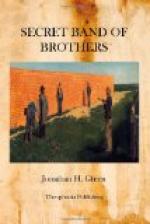I told Wyatt that a man by the name of Tucker was supposed to have been murdered about that date between Natchez and New Orleans. He laughed, and said he knew something about it. “Myself and three others,” said he, “went to Natchez as produce speculators. Tucker owned a boat load of produce. We contracted for it, advanced him money sufficient to pay off his hands, telling him we had sufficient help; that he could go with us to New Orleans, and that on our arrival there, we would pay him the balance due. He did so. We paid him in a Mississippi bath. We murdered him, and then threw him overboard.” I asked him if he ever was suspected. He said, not that he knew of. I asked him if he was not afraid, when he was committing such a murder, that the body might rise upon the water and be the means of their being suspected. “We cut their entrails out,” said he, “then they never rise until resurrection-day.” I felt heart-sick at his dreadful description of the murder of Tucker. I knew him. He was a good, honest man. I arose from my seat, took him by the hand, and bade him good day, promising him to call again. I will, in my next, inform you of the particulars of my third visit, which will lead you further into his dreadful history. I will in my next also speak of his views on the subject of religion.
Yours, truly,
J. H. GREEN.
Auburn, April 17, 1845.
No. 4.
The following letter was written and published by the unanimous consent of every honest citizen of Cleveland, Ohio, of which place I can only speak in the language of commendation. It is one of the most virtuous cities in the state, according to its population; and from the interest two of the principal organs took in behalf of the anti-gambling cause, I am certain that no filthy sheet can ever pollute its moral principles.
To the Editor of the Cleveland Plaindealer:
Mr. Gray, Sir—The Herald of last evening contained a letter over the signature of O.E. Morrill, dated July 25th, 1845, charging J. H. Green, “the Reformed Gambler,” with misrepresenting the confessions made to him by “Wyatt, the murderer.” The Anti-Gambling Society of this city have requested me, as its President, to publish the following letter, in justice to Mr. Green, and in answer to Mr. Morrill. It was written on the 12th of July last, in reply to Mr. Morrill’s “private note,” referred to in his letter published last evening. A true copy was made, and the original forwarded to Mr. O.E. Morrill on the day of its date, by Dr. Cowles, of this city. Deeming this letter a complete refutation of the charges against Mr. Green, the Society have taken the liberty, without his knowledge, of requesting you to place it before the public.




